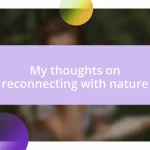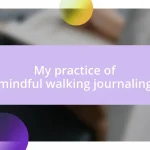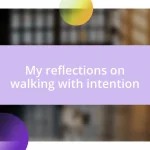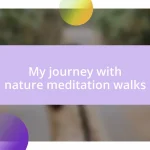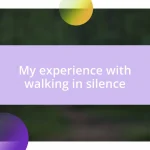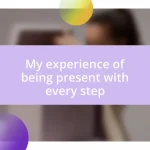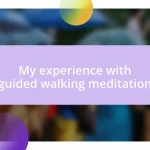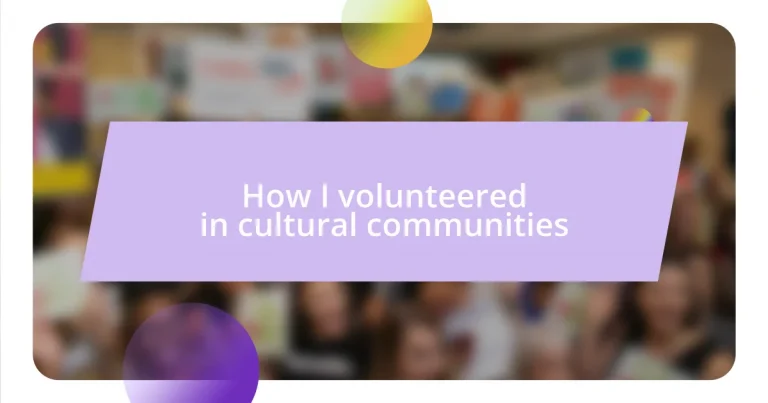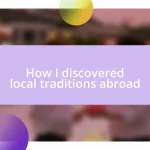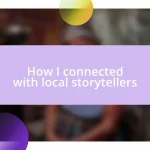Key takeaways:
- Understanding cultural community needs requires active listening and engagement, fostering trust and collaboration through direct participation.
- Building meaningful relationships in cultural communities enhances the volunteer experience, emphasizing the importance of cultural sensitivity, shared stories, and small gestures of recognition.
- Continuing engagement after volunteering helps maintain connections and allows volunteers to leverage their experiences for ongoing community impact and inspiration.
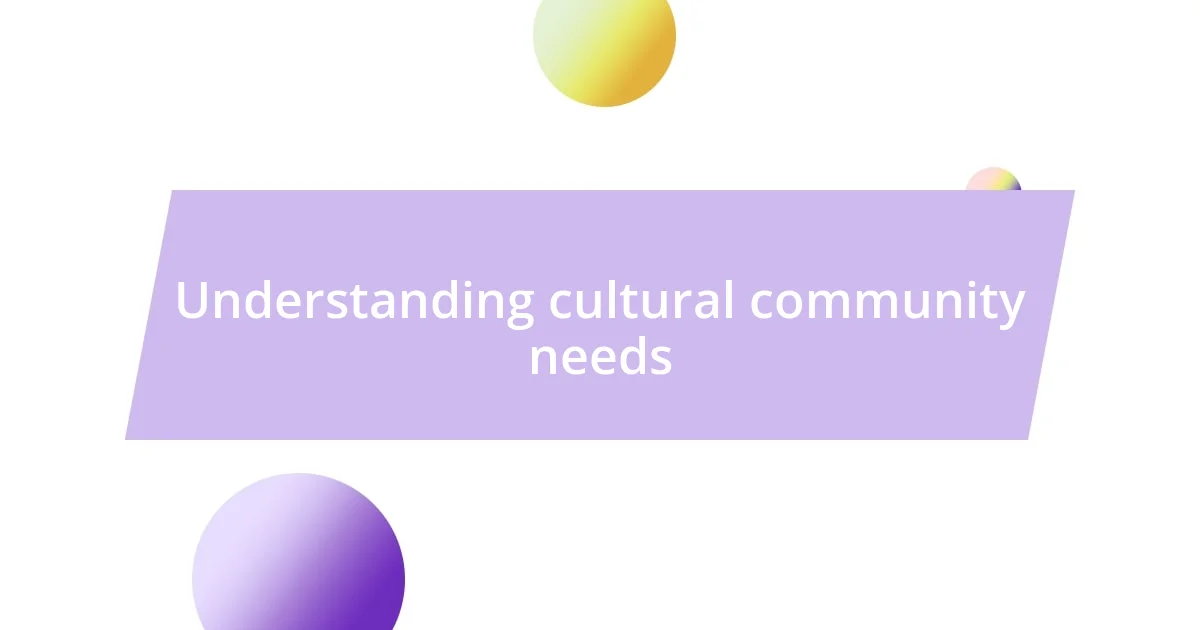
Understanding cultural community needs
Understanding the needs of cultural communities is often about listening and observing. I remember attending a community meeting where residents expressed a longing for culturally relevant programs. Their passion showed me how crucial it is to create spaces that honor their traditions and values. Have you ever felt unheard in a group simply because your background didn’t seem to fit?
Delving deeper, I found that some members needed more than just acknowledgment; they required tangible support, like language classes or mentorship programs tailored to their unique contexts. I recall a woman who shared her struggle with navigating local services due to language barriers, highlighting how vital accessibility is. This experience opened my eyes to the real-world implications of cultural understanding in community programs.
In my volunteer work, I’ve witnessed firsthand the transformative power that comes when communities actively participate in identifying their own needs. Whether it’s through surveys or informal conversations, engaging directly with individuals fosters trust and collaboration. Have you ever participated in a project where your input led to meaningful change? It truly reinforces the idea that understanding cultural community needs is not just beneficial; it’s essential for building respect and lasting connections.
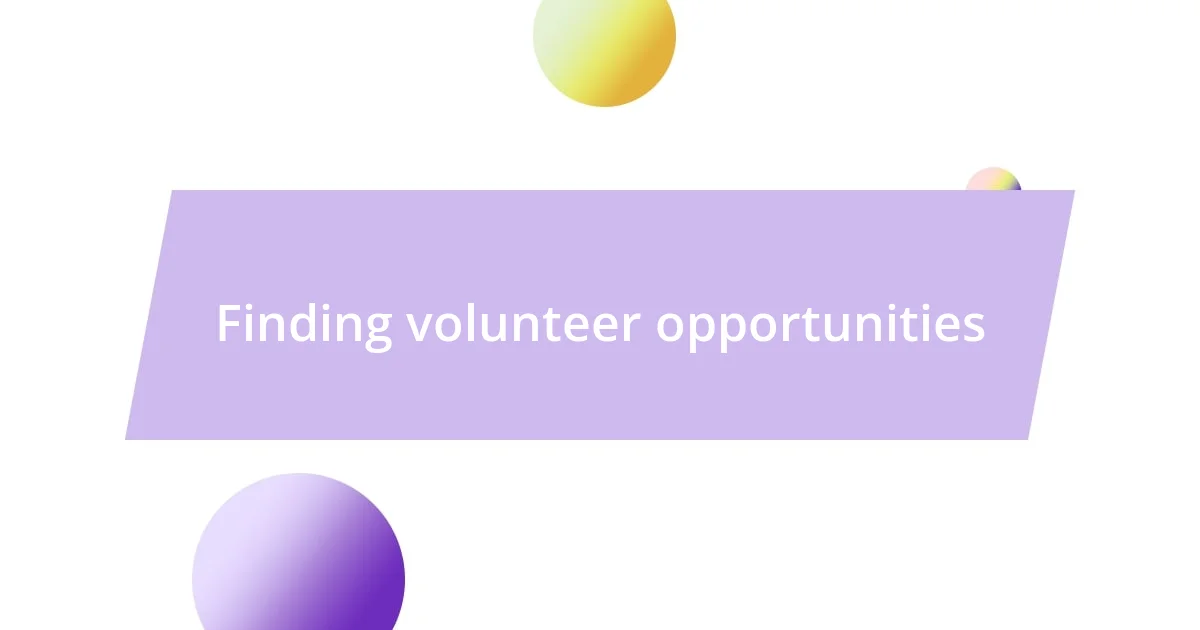
Finding volunteer opportunities
Finding volunteer opportunities can sometimes feel overwhelming, but in my experience, community-organized events can be a fantastic starting point. I remember how a local cultural fair introduced me to various organizations looking for volunteers. Attending such events not only opened my eyes to the needs of the community but also allowed me to connect with like-minded individuals. Conversations flowed naturally, and suddenly, potential volunteer positions felt attainable and relevant.
To streamline your search for volunteer opportunities, consider these tips:
- Check community bulletins or online forums for local events and gatherings.
- Reach out to cultural centers or non-profits directly; they often have a list of available roles.
- Utilize social media groups dedicated to volunteering; these platforms can be goldmines for current opportunities.
- Network with friends and family; sometimes, a personal recommendation can lead to unexpected chances.
It’s about getting out there, engaging with people, and putting yourself in situations where you might discover something unexpected. During my journey, I often found that the best volunteer roles came from spontaneous moments rather than planned searches.
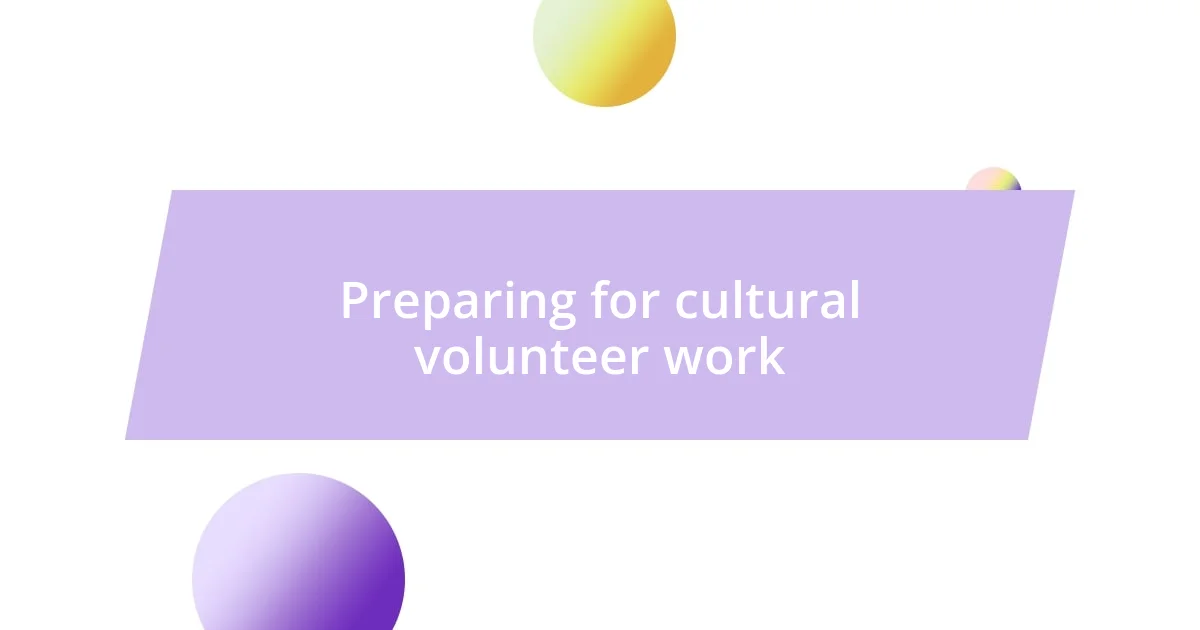
Preparing for cultural volunteer work
Preparing for cultural volunteer work involves a thoughtful approach that respects and embraces the diversity you’re about to encounter. When I first considered volunteering, the biggest hurdle was recognizing my own biases and understanding that I needed to approach every interaction with an open mind. One particular instance that stands out to me was attending a pre-volunteer orientation that highlighted the importance of cultural sensitivity and local customs. It helped me realize how much I had to learn and the depth of respect I needed to cultivate.
Another key aspect is committing time to learn about the community’s history and traditions. In my experience, reading books or watching documentaries can offer insights that are more emotionally resonant than mere facts. I recall being moved by a documentary that showcased the struggles of immigrant families, which empowered me to approach my volunteer work not just as a service but as a partnership with the community. Wouldn’t you agree that knowledge can transform our perspective and make our volunteering experience richer?
To top it off, practical arrangements can make a world of difference. I always ensure I have the right resources, from transportation plans to having cultural materials on hand. In one of my early volunteering moments, I forgot my language guidelines and felt embarrassed when communicating with community members. It taught me the importance of preparation and adaptability in cultural work. How about you? Have you prepared any essentials that enhanced your volunteer experience?
| Preparation Aspect | Personal Experience |
|---|---|
| Cultural Sensitivity Training | Participated in an orientation that opened my eyes to local traditions. |
| Research on Community History | Watched documentaries that deepened my understanding and emotional connection. |
| Practical Arrangements | Learned the hard way about the necessity of having language resources readily available. |
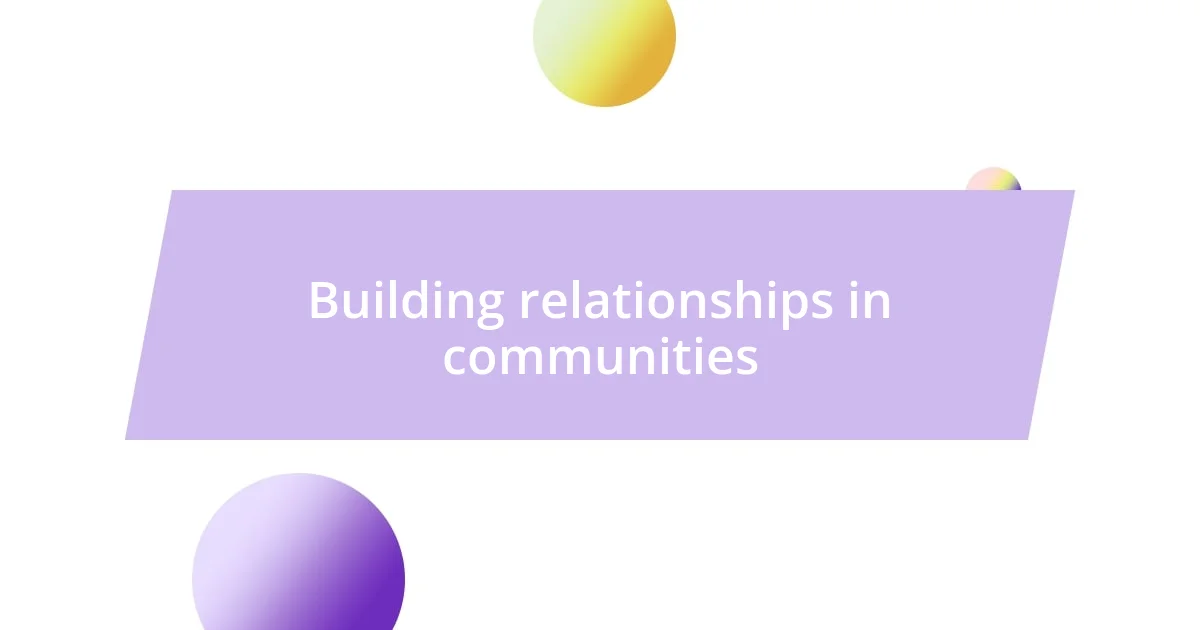
Building relationships in communities
Building meaningful relationships in cultural communities is essential for creating lasting connections. I remember my first volunteering gig at a local art festival; it was there that I met volunteers from diverse backgrounds. We spent hours setting up booths, sharing stories over coffee, and laughing about our mishaps. That shared experience forged bonds that went beyond just wanting to help; it made us a community in the truest sense. Don’t you think such moments are what truly enrich our lives?
As I dove deeper into my volunteer work, I discovered the power of listening. One afternoon, an elder in the community shared heartwarming tales of their childhood traditions while we worked together in a community garden. Those conversations not only instilled a sense of respect but also painted a vivid picture of the culture I was a part of. I often found myself reflecting on how these moments of vulnerability can create a sense of belonging—not just for the people I served, but for myself as well.
What if I told you that sometimes, it’s the small gestures that mean the most? During a cultural festival, I made it a point to remember the names of fellow volunteers and greet them each time we crossed paths. It was amazing to see how this simple act of recognition sparked smiles and fostered camaraderie. In my experience, such seemingly small actions can lead to profound relationships that elevate the volunteer experience, making it a mutual journey of learning and growth. Wouldn’t you agree that every connection, no matter how small, can have a ripple effect in our communities?
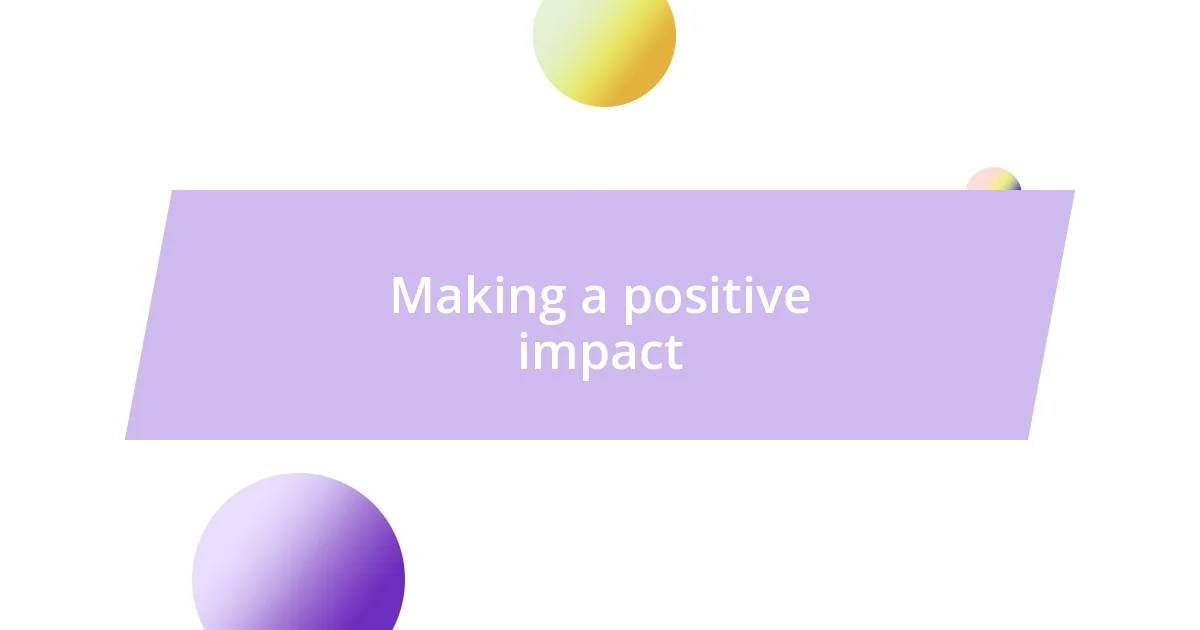
Making a positive impact
Making a positive impact in cultural communities requires a genuine commitment to understanding the unique challenges they face. I vividly remember attending a community meeting where local leaders shared their struggles with preserving cultural identity amid modernization. Their passion moved me deeply and motivated me to contribute more than just my time. I realized that my involvement could help amplify their voices, making their stories resonate beyond their immediate circles. Don’t you think empowering communities is one of the most meaningful ways to contribute?
An essential part of making a positive impact is recognizing the importance of shared initiatives. One beautiful moment I experienced was during a collaborative art project designed to showcase cultural heritage. We had a diverse group of volunteers, each bringing their own skills and creativity. As we painted together, I felt a real sense of belonging and purpose. It dawned on me how such projects create a platform not just for self-expression but also for community pride. Isn’t it inspiring how art can unify people from different backgrounds?
Moreover, I’ve come to understand that even small acts of kindness can accumulate into significant change. I recall a day when I simply helped a local shop owner by organizing an event to promote their business. His gratitude was palpable, and it left a lasting impression on me. It reinforced the idea that every act of service counts, no matter how insignificant it may seem at the moment. Have you ever noticed how helping one person can spark a chain reaction of positivity within a community? It’s incredible how interconnected we all are in our journeys of making a difference.
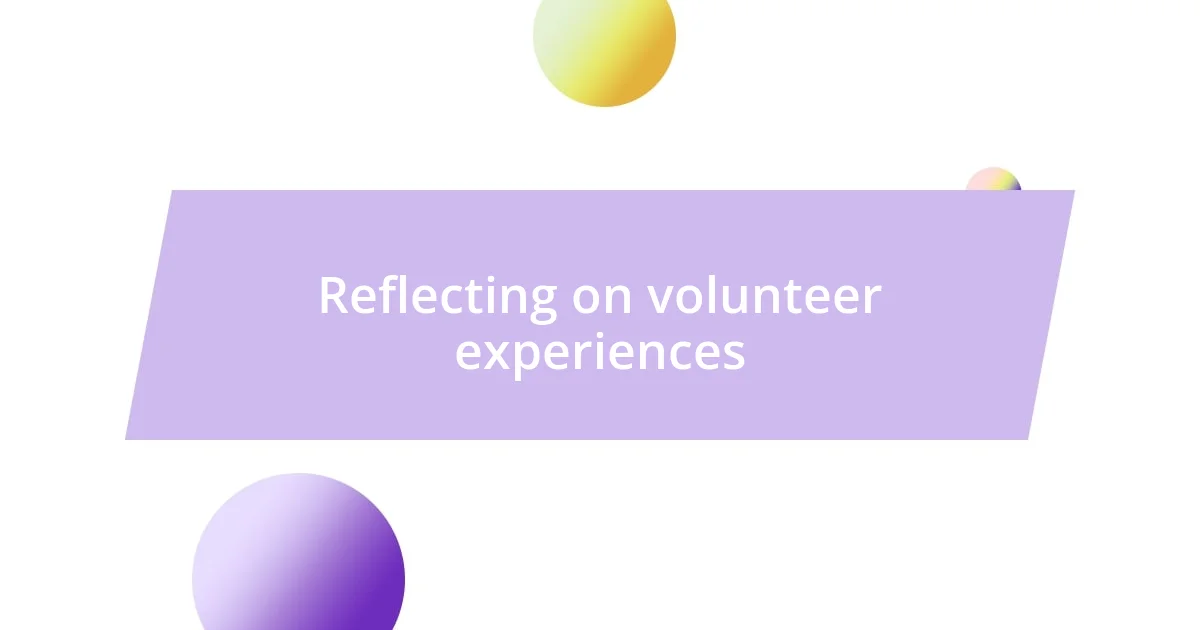
Reflecting on volunteer experiences
Reflecting on my volunteer experiences has often led me to unexpected insights about myself and the communities I serve. I recall one volunteer day when we organized a storytelling event for children. Listening to their laughter and wide-eyed expressions as they absorbed tales from different cultures was a revelation. Moments like these remind me that volunteering isn’t just about giving; it’s also about receiving the rich tapestry of shared experiences.
What surprised me most was how volunteering often pushes you outside your comfort zone. I found myself leading workshops on traditional crafts, speaking to groups much larger than I was accustomed to. Initially, there was a wave of anxiety washing over me—Would I be able to engage them? But as I shared my own failures and successes in learning those crafts, I felt barriers breaking down. I’ve realized that vulnerability is a powerful connector, transforming strangers into a tight-knit community.
While reflecting on various projects, I often think about the legacy we leave behind. During a cleanup drive in a local park, I saw families coming together, their children excitedly picking up litter while chatting and laughing with one another. I remember a parent mentioning how this initiative reawakened their love for nature. These experiences highlight the profound impact our efforts can have, sparking conversations that continue long after the event. Isn’t it fascinating to consider that the seeds we plant today can grow into something meaningful for future generations?
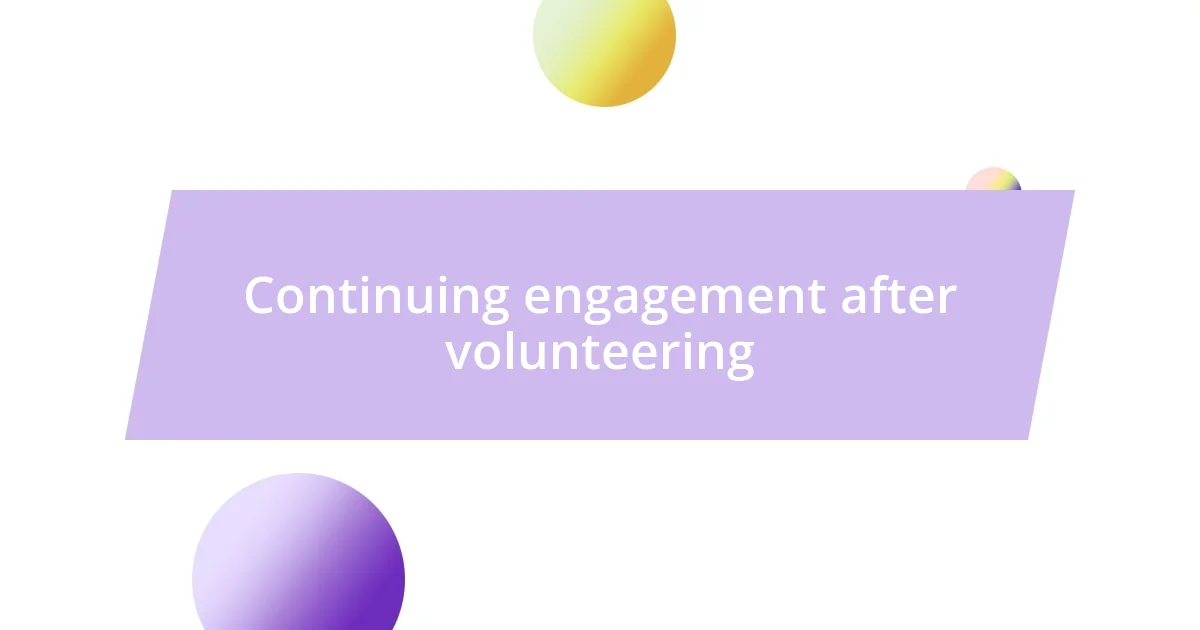
Continuing engagement after volunteering
Once my volunteering stint ended, I found myself reflecting on the relationships I had built, and I felt compelled to stay connected. I recall bumping into a fellow volunteer at a local cafe days later, and it reignited that spark of collaboration. We ended up organizing a monthly meet-up where former volunteers could share their experiences and brainstorm ideas for future initiatives. Don’t you find that keeping those connections alive can create a ripple effect of inspiration?
Continuing to engage with the community seemed essential, too. I remember attending a cultural festival that I had once participated in as a volunteer. It was heartwarming to see familiar faces and witness how the efforts we had put in were evolving. Gathering feedback from attendees and sharing stories helped foster a sense of ownership among previous volunteers. Isn’t it rewarding when past efforts bloom into ongoing celebrations of culture?
It’s interesting how the lessons learned during volunteering continue to resonate in everyday life. After I volunteered at a local educational program, I took it upon myself to tutor children on weekends. The experience not only reinforced my commitment to the cause but also allowed me to witness the growth of these kids over time. I often wonder: how can we leverage our experiences as volunteers to inspire others in our circles? The possibilities for ongoing impact feel limitless when you stay engaged in meaningful ways.
